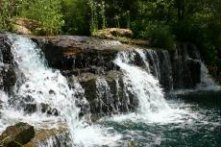
Hydrologist Brian Berkowitz sees the movement of water through rock formations as a random and jagged path, sometimes virtually stopping, sometimes surging ahead. The description could be aptly applied to his career, which has landed him at the forefront of hydrology, an increasingly important field as the world's water supply is threatened by pollutants, salinization, and drought. He has arrived here by chance, through a series of plot twists in his life. Now he runs a large lab at Weizmann, where he studies groundwater hydrology from every angle.
"Like all good science—particularly at Weizmann—our work is curiosity driven," he said recently, during a visit to the national ACWIS office. "For example, you have an oil spill—the oil seeps into the groundwater and starts to spread. The engineering approach is to drill holes and pump out the contaminated water—but six months later the contamination is back." To solve the problem, he said, "You have to go back and determine how the oil behaves, how it travels, and what you can do with it. How does the oil interact with the water?"
Prof. Berkowitz has developed a highly accurate model of groundwater movement that can provide information to develop sound environmental policy. The ability to predict the flow of water and pollutants is critical for effective management and remediation of groundwater resources, and for protection against accidental exposure of radioactive and toxic wastes, as in the proposed use of Yucca Mountain in Nevada for underground repositories for radioactive and toxic wastes.
Prof. Berkowitz began his career in applied math, receiving a degree in petroleum engineering. While studying music in Israel (he is a passionate bassoon player), he happened to meet a chemical engineer. When he revealed his interest in the flow dynamics of oil, the man mentioned that he knew a world-renowned Israeli hydrologist. Reasoning that the only difference between water and oil was density and viscosity, he jumped into hydrology with both feet and has made quite a splash.
The biggest project in his lab is challenging assumptions about water and pollutant movement underground. The model in use is, quite simply, wrong, Prof. Berkowitz said. "We know it has an enormous error, and we've developed a new theory that seems to describe beautifully what's going on." His lab is developing the theory with computer software that models it, and encouraging others to adopt the theory by placing free software online.
He is also working on another legacy: last year, his parents were tragically killed in a car accident. He has taken on his late father's work of a revolutionary way of processing oil and coal, which could have a profound impact on the coal and oil industry. "I taught myself hydrocarbon chemistry and developed a set up to test my father's ideas—all those years it never occurred to us to work together, even though what we did was so related."
How does he keep up with it all? "I don't sleep much," he said.
Prof. Brian Berkowitz holds the Sam Zuckerberg Professorial Chair in Hydrology.
